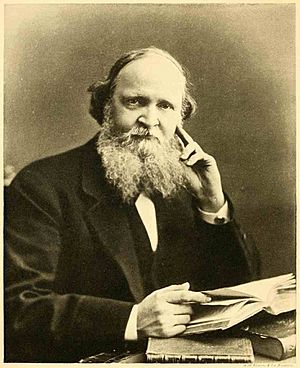William Dwight Whitney facts for kids
Quick facts for kids
William D. Whitney
|
|
|---|---|

Portrait of Whitney
|
|
| Born |
William Dwight Whitney
February 9, 1827 |
| Died | June 7, 1894 (aged 67) |
| Education | Williams College University of Berlin University of Tübingen University of Breslau |
| Occupation | Linguist, philologist |
| Employer | Yale University |
| Spouse(s) | Elizabeth Wooster Baldwin |
| Children |
|
| Relatives | Whitney family |
| Signature | |
William Dwight Whitney (born February 9, 1827 – died June 7, 1894) was an American expert in languages. He was a linguist, a philologist (someone who studies language in historical texts), and a lexicographer (someone who writes dictionaries). He was famous for his work on Sanskrit grammar and ancient Indian texts called the Vedas. Whitney believed that language is a social tool, meaning it changes and grows based on how people use it together. He was the first leader of the American Philological Association and the main editor of The Century Dictionary.
Contents
William Dwight Whitney's Early Life
William Dwight Whitney was born in Northampton, Massachusetts, on February 9, 1827. His father was Josiah Dwight Whitney, and his mother was Sarah Williston.
He started college at Williams College when he was just fifteen years old. He graduated in 1845. After college, he kept studying and worked at a bank for a few years. At first, he was interested in science, especially nature. In 1849, he helped his older brother, Josiah Whitney, with a study of the Lake Superior area. William helped with plants, weather observations, and keeping records. During this trip, he started learning Sanskrit, an ancient language from India, in his free time. Around this time, Whitney was living near Yale University in Connecticut.
Studying Languages in Europe
In 1850, Whitney traveled to Germany to study philology, which is the study of language in historical sources. He focused especially on Sanskrit. He spent his winters in Berlin, learning from famous scholars like Franz Bopp and Albrecht Weber. In the summers, he did research with Rudolph von Roth in Tübingen. While in Germany, Whitney began a huge project: preparing a special edition and translation of the Atharvaveda, an ancient Indian text.
His deep knowledge in this area quickly made him well-known. In 1853, Yale University created a new job just for him: "Professor of Sanskrit." This was the first job of its kind in the United States. However, he didn't get his doctoral degree until 1861, from the University of Breslau. He also taught modern languages at the Sheffield Scientific School at Yale. From 1857, he served as the secretary for the American Oriental Society, later becoming its president in 1884. In 1863, the American Philosophical Society also welcomed Whitney as a member.
Family Life
On August 28, 1856, William Whitney married Elizabeth Wooster Baldwin. Her father, Roger Sherman Baldwin, was a US Senator and Governor of Connecticut.
William and Elizabeth had six children:
- Edward Baldwin Whitney, born in 1857, who later became an Assistant US Attorney General. His son was the famous mathematician Hassler Whitney.
- Williston Clapp Whitney, born in 1859, who passed away as a young child.
- Marian Parker Whitney, born in 1861, who became a professor of German at Vassar College.
- Roger Sherman Baldwin Whitney, born in 1863, who also passed away as a child.
- Emily Henrietta Whitney, born in 1864.
- Margaret Dwight Whitney, born in 1866.
William Dwight Whitney passed away at his home in New Haven, Connecticut, on June 7, 1894.
William Dwight Whitney's Career and Contributions
Whitney helped update the definitions for the 1864 edition of Webster's American Dictionary. In 1869, he helped start and became the first president of the American Philological Association. In the same year, he also became Yale's professor of comparative philology, which means he studied how different languages are related.
He also taught French and German at Yale until 1886. Whitney translated parts of the Vedas (ancient Indian texts) into poetry. He wrote many papers about the Vedas and linguistics, which were later collected into books called Oriental and Linguistic Studies. He also wrote several books about language and grammar textbooks for English, French, German, and Sanskrit.
His book Sanskrit Grammar (1879) was very important. In it, he shared his thoughts on the Ashtadhyayi, an ancient Sanskrit grammar book written by Panini. Whitney described Panini's work as "algebra-like rules" that were very short but sometimes hard to understand.
Later, a famous linguist named Ferdinand de Saussure gave Whitney credit for pointing out that words and their meanings are connected in an "arbitrary" way. This means there's no natural reason why a certain sound (like "tree") means a specific object; it's just what people have agreed upon. Another linguist, Roman Jakobson, said that Whitney greatly influenced European language studies. Whitney taught that language is a "social institution," meaning it's a system of agreed-upon signs that people use together. This idea was very important to Saussure and other linguists.
Even though he had heart problems in his later years, Whitney was the main editor of the first edition of the respected Century Dictionary. This huge dictionary was published between 1889 and 1891.
Awards and Recognition
William Dwight Whitney received several honors for his important work:
- In 1860, he was chosen as a Fellow of the American Academy of Arts and Sciences.
- In 1868, he became a member of the American Antiquarian Society.
- In 1881, he was honored as a foreign knight of the Prussian order Pour le Mérite for his contributions to science and arts.
Images for kids
See also
 In Spanish: William D. Whitney para niños
In Spanish: William D. Whitney para niños
 | Delilah Pierce |
 | Gordon Parks |
 | Augusta Savage |
 | Charles Ethan Porter |

